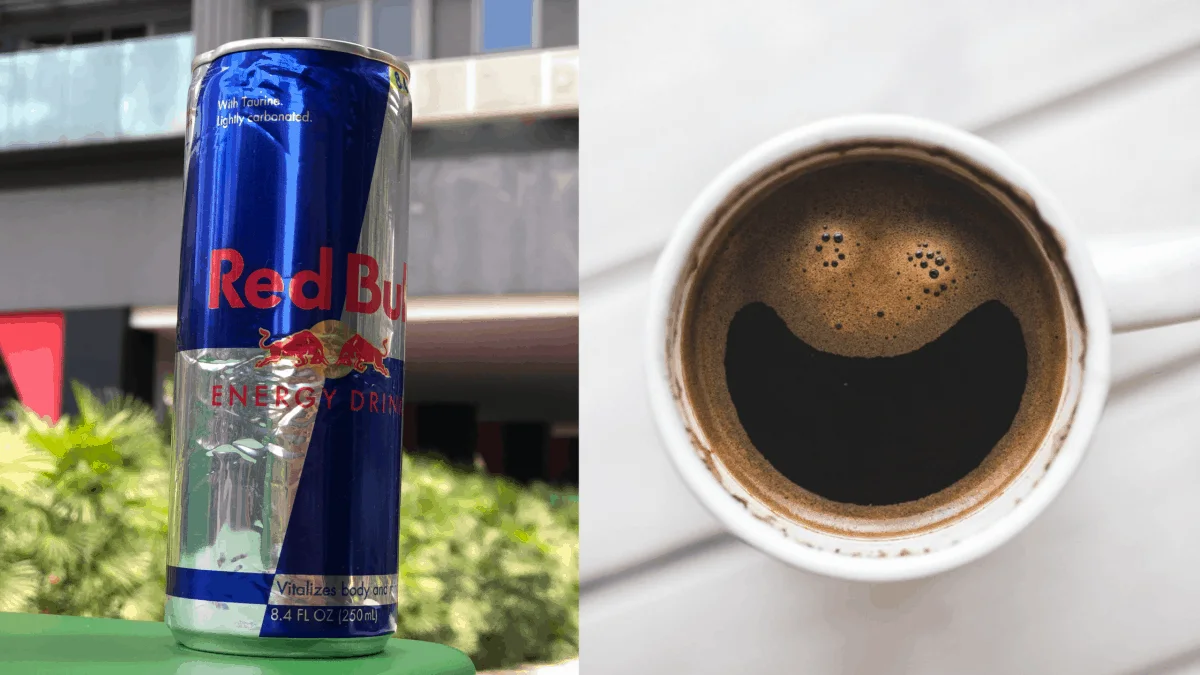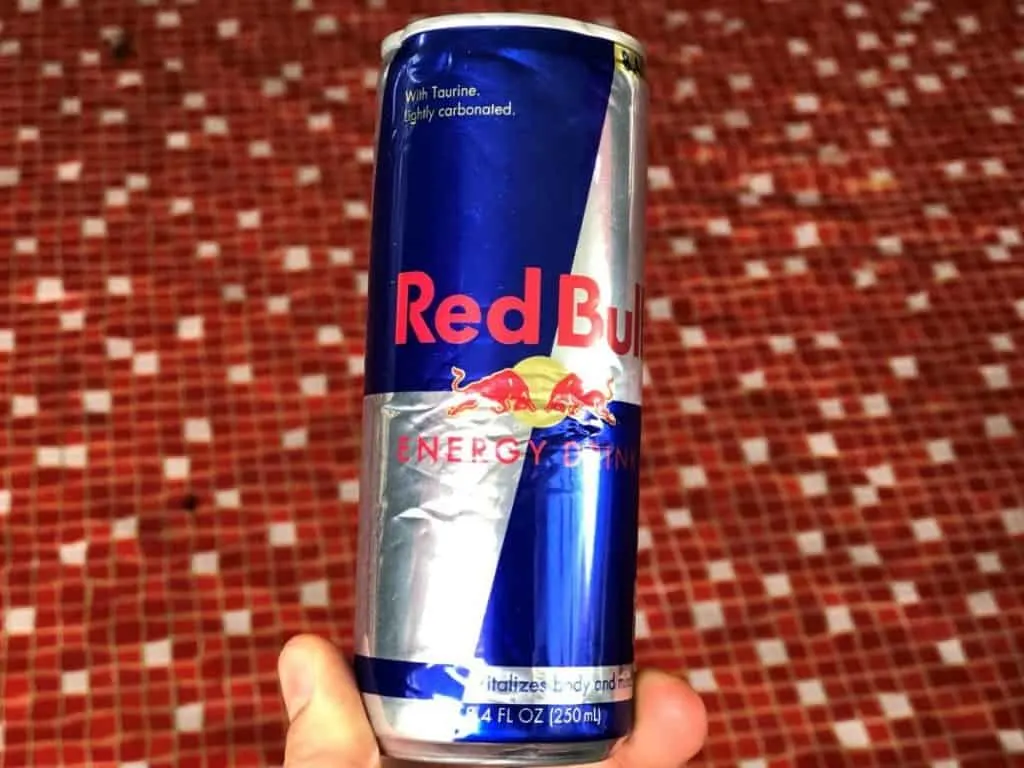While coffee remains one of the most popular caffeinated beverages in the world, energy drinks are also a close runner-up, and there is one brand that everyone knows regardless if they are a fan of energy drinks or not. Red Bull.

You may be wondering what’s the difference between a cup of coffee and a can of Red Bull, and if there are any noticeable benefits to preferring one over the other. Well, this article will address all your questions and concerns about this topic and more.
But to weigh in on their differences and similarities, let’s dive deeper into what these two drinks can offer you in terms of efficacy, safety, and variety. And then I’ll let you decide which one is best for your needs and lifestyle.
But to give you a general idea about the debate over “Red Bull vs Coffee”, I would say coffee is the superior option, only because there are so many ways to customize it unlike Red Bull, which has a set amount of caffeine and sugar that may be very unhealthy if consumed in large amounts.
If you want to learn more about how Red Bull compares to a cup of coffee, read on, so you can make the best choice for yourself.
Contents
Caffeine in Red Bull and Coffee
We all know the role of caffeine: stimulating your nervous system to make you feel alert and more awake. This is the main reason why they are so popular, especially in fast-paced societies where people are obsessed with productivity.
Caffeine is an adenosine inhibitor, which inhibits adenosine receptors (chemicals in our brain that make us drowsy). Caffeine then suppresses its effects on our brain, making us more attentive and, in certain cases, activating adrenaline, which makes us feel energized and boosted.

The caffeine level of a normal can of Red Bull (8.4 fl oz) is actually quite low, with only 80mg per serving, compared to other energy drinks like Raze and Bang, which may contain doses up to 300mg and above.
If you’re new to energy drinks and want to see if all that caffeine is truly for you, an 8.4 fl. oz can of Red Bull is a great place to start.
This can be considered a fair amount even for those who have a low tolerance for caffeine, considering that the daily limit recommended by the FDA is 400mg.
But as a general rule of thumb, you don’t want to be consuming the maximum limit every day, so doses as low as 200mg a day are actually ideal.
Your average cup of Joe has around 95mg of caffeine. This may still depend on what type or kind of coffee you’re getting and how they are brewed. A shot of espresso (1.75 fl. oz.) may have 63g of caffeine, whereas a 12 fl. oz. of cold brew coffee could carry 153mg, and so on.

What’s The Right Amount of Caffeine?
According to the FDA, caffeine intake should not exceed 400mg per day regardless of where you’re getting your caffeine from, whether it’s from a cup of coffee or a can of Red Bull.
While those who are especially caffeine-sensitive may experience some side effects even when consuming low doses, those who are caffeine tolerant may only experience the same symptoms if they consume amounts above the recommended daily intake :
- Insomnia
- Palpitations
- Anxiousness
- Nausea
- Hallucinations
- Headache, and;
- Dysphoria
Other health risks and potentially lethal side effects that may arise from consuming too much caffeine at once include:
- Convulsions
- Irregular heartbeat
- Hypertension
- Osteoporosis
- Twitching of muscles
- Death
Mild intake is strongly recommended if you wish to prevent these effects. So be cautious to keep track of your intake even with regular coffee because those can be just as deadly as a can of Red Bull.
Fortunately, caffeine leaves your system completely after 12 hours, with half of it completed eliminated from your body 5 hours after consumption. Here are some tips to assist you to prevent caffeine’s harmful effects:
- Stop using caffeine as soon as you notice any adverse effects.
- Stop consuming caffeine 6-8 hours before going to bed if you don’t want to suffer from insomnia.
- Drink plenty of water.
- Maintain your level of activity.
- Perform breathing exercises.
- Consume fiber-rich meals.
To know more about caffeine and its effects, here’s a video by Science Insider:
Ingredients In Red Bull
Both coffee and Red Bull give you a jolt of energy, yet other than caffeine, water, and perhaps some sweeteners, they have quite different formulations.
Regular coffee may contain some dairy products like cream or non-dairy substitutes like almond milk, and extra flavors like cinnamon, chocolate, and caramel. Red Bull on the other hand contains a slew of synthetic vitamins, preservatives, stabilizers, and supplements like taurine.
Moreover, energy drinks are most often carbonated and best served cold, while regular coffee can be consumed piping hot or with ice, depending on your preference, the time of day, or the weather.
Coffee is generally less complicated than energy drinks like Red Bull, so the best way to illustrate this is to assess the nutritional value and ingredients list of Red Bull just to give you some idea about just how complex energy drinks can be.
| Typical Values | Red Bull (8.4 fl. oz) |
| Energy | 110 calories |
| Fat (Of which Saturated) | 0g (0g) |
| Carbohydrate (Of which Sugars) | 28g (27g) |
| Caffeine | 80mg |
| Sodium | 105mg |
| Vitamin B3 (Niacin) | 22mg |
| Vitamin B5 (Pantothenic Acid) | 5mg |
| Vitamin B6 | 5mg |
| Vitamin B12 | 5.1µg |
And here’s a list of Red Bull’s ingredients:
- Carbonated water
- Sucrose
- Glucose
- Citric acid
- Taurine
- Sodium bicarbonate
- Magnesium carbonate
- Caffeine
- Niacinamide (Vitamin B3)
- Calcium pantothenate (Vitamin B5)
- Pyridoxine HCl
- Vitamin B12
- Natural and Artificial Flavors
- Colorings
As you can see, Red Bull contains some very hard to pronounce ingredients and other compounds that you don’t normally see in, say, a Starbucks venti macchiato.
Sugar In Red Bull
Red Bull contains over 27g of sugar per 8.4 fl.oz serving.
Sugar is a carbohydrate that the body is able to convert into energy, as we all know. That’s why most energy drinks contain a lot of sugar, not just to satisfy the sweet tooth but also to increase the energy-boosting impact.
However, most energy drinks have an insane amount of sugar for a single serving. Just to give you an idea, the daily sugar allowance for women is 25g (6 teaspoons) and for males is 36g (9 teaspoons).
Red Bull’s 27g is 108 percent of what a female consumer may safely eat in a day and 75 percent of what a male consumer should ingest. So you can see why energy drinks can be dangerous to your health.
While you can customize the sugar content in your coffee, whether it’s a Starbucks order or a homemade cup of latte, you can’t actually take the sugar out of a pre-made can of Red Bull.
Taurine in Red Bull
Taurine is an organic component that may be found in various foods and is commonly used in energy drinks. Taurine has been shown to provide several health benefits, including a lower chance of disease and improved athletic performance.
Red Bull contains around 1 gram (1000 milligrams) of taurine, but the recommended daily dosage is 500–2000 milligrams. Because the amount of Taurine in Red Bull is less than the recommended dosage, it is considered safe.
However, you won’t find taurine in a regular cup of coffee, not in any coffee house at least. There are taurine supplements that come in capsule or tablet form that I suppose you can grind up and add to your espresso, but I don’t want to give you any bad ideas.
B-Vitamins in Red Bull
Another important selling factor of Red Bull is the high concentration of B-Vitamins. B-vitamins are important because they support your body’s natural energy regulation process, which may be why they are so commonly used in energy drinks.
However, contrary to popular belief, ingesting extra B-vitamins won’t give you more energy unless you are deficient in those vitamins. And even so, B-vitamins just help your body produce the energy it needs, they don’t supply energy by themselves.
Here’s a table summary of the vitamin-B included in Red Bull:
Purpose | Red Bull (Per 8.4 fl.oz) | Daily % Value | Tolerable Upper Intake Level | |
| Vitamin B3 (Niacin) | Converts nutrients to energy; repairs DNA; supports system as an antioxidant. | 22mg | 100% | 35mg |
| Vitamin B5 (Pantothenic Acid) | Breaks down fats, proteins, and coenzyme A; promotes healthy skin | 5mg | 80% | N/A |
| Vitamin B6 | Supports the central nervous system; ensures smooth metabolism | 5mg | 250% | 100mg |
| Vitamin B12 | Generates red blood cells; maintains brain function and nerve tissue health. | 5.1µg | 50% | N/A |
While the quantity of Vitamin B6 in Red Bull may seem frightening at over 250 percent of your daily need, Vitamin B6 is water-soluble, so any excess is rapidly eliminated.
Unfortunately, you won’t get any B-vitamins from a regular cup of coffee, not unless you purposely add it in, which is unnecessary and frankly speaking, weird. If you want extra vitamins, pop a pill, don’t grind it into your morning latte.
Is Red Bull stronger than coffee?
Red Bull and coffee both contain caffeine, which is a stimulant that can help to increase energy, focus, and alertness. However, the amount of caffeine in Red Bull and coffee can vary depending on the specific product and serving size.
A standard 8.4-ounce can of Red Bull contains about 80 milligrams of caffeine, while a typical 8-ounce cup of coffee contains anywhere from 95 to 200 milligrams of caffeine, depending on the brewing method and type of coffee.
It’s also worth noting that Red Bull and coffee are different beverages with different ingredients and nutritional profiles. Red Bull contains other ingredients such as taurine, B vitamins, and sugar or artificial sweeteners, while coffee is a natural beverage made from roasted coffee beans.
Overall, whether Red Bull or coffee is “stronger” depends on several factors, and both beverages can provide a boost of energy and focus when consumed in moderation.
How many Red Bulls equal a cup of coffee?
As a general guideline, a standard 8.4-ounce can of Red Bull contains about 80 milligrams of caffeine, while an 8-ounce cup of brewed coffee typically contains anywhere from 95 to 200 milligrams of caffeine, depending on the type and brewing method.
With these numbers in mind, it would take approximately one can of Red Bull to equal the amount of caffeine in a small cup of coffee. However, it’s worth noting that the actual caffeine content can vary depending on the specific product and serving size, so the comparison may not always be exact.
Is it better to drink coffee or energy drinks?
Whether it’s better to drink coffee or energy drinks depends on several factors, including your individual health, lifestyle, and personal preferences. Here are some factors to consider:
- Caffeine content: Both coffee and energy drinks contain caffeine, which can help to increase energy and mental alertness. However, the caffeine content can vary depending on the specific product and serving size. In general, coffee tends to have a higher caffeine content than energy drinks.
- Nutritional value: Coffee is a natural beverage made from roasted coffee beans, while energy drinks often contain added ingredients such as sugar, artificial sweeteners, and other stimulants like taurine and B vitamins. Coffee contains some beneficial nutrients such as antioxidants, while energy drinks do not have the same nutritional benefits.
- Health risks: Excessive consumption of caffeine or energy drinks can increase the risk of negative health outcomes such as anxiety, high blood pressure, and heart problems. However, moderate coffee consumption has been associated with potential health benefits such as reduced risk of certain diseases.
- Personal preferences: Ultimately, whether to drink coffee or energy drinks may depend on your personal preferences and lifestyle. Some people prefer the taste and aroma of coffee, while others prefer the convenience and variety of energy drinks.
Overall, there is no one-size-fits-all answer to whether coffee or energy drinks are better. It’s important to consume both in moderation, be aware of the potential health risks, and listen to your body to determine what works best for you.
Which Is Better, Red Bull or Coffee?

Personally, I’d say it’s all a matter of preference. Coffee may all be natural and doesn’t contain any chemicals compared to Red Bull which is processed and contains other energy-boosting components, so it is obvious why many experts may recommend regular coffee
Most of coffee’s benefits are linked to its antioxidants. A review of 218 studies associated 3–5 daily cups of coffee with a lower risk of several types of cancer, as well as heart disease and heart-related death.
The same review linked coffee intake to a lower risk of type 2 diabetes, chronic kidney disease, Parkinson’s, and Alzheimer’s. Like Red Bull, coffee can increase energy, as well as both mental and exercise performance
Healthline
On the other hand, Red Bull might contain a whole lot of energizing ingredients but aren’t exactly necessary. Moreover, with regular coffee, you are free to control the amount of sugar you consume or even opt for artificial sweeteners like stevia or monk fruit extract.
I suppose that it really depends on how much you can tolerate coffee. Both are qualified to give you the boost you need, but you must remember that both can be dangerous and harmful when consumed excessively.
How Many Red Bulls Can You Have In A Day?
You should not consume more than one Red Bull each day. However, this is not only due to the caffeine content. The amount of sugar contained in a single serving might potentially be an issue.
Although Red Bull is not totally harmful to your health in small to moderate doses, you should restrict your use because certain of its components may have long-term adverse effects.
All of the other information I’ve presented previously should make it clear as well that Red Bull is not as beneficial to your health as it may seem.
How Many Cups of Coffee Can You Have In A Day?
Many studies believe that four cups of coffee per day is a healthy quantity as long as it stays under the 400mg caffeine limit.
Just keep in mind that caffeine’s half-life might take up to 5 hours to leave your system and 12 hours to wear off entirely. If you take caffeine well into the evening, you may get insomnia, so keep track of when you consume it and be sure not to take four cups consecutively. Space them out over several hours.
Coffee is an amorphous substance. It will not actively help your health, but a moderate amount of it is not necessarily harmful.
Considering all of this, intake of energy drinks, coffee, or any caffeinated beverage should be done in moderation. Understanding your caffeine tolerance is just as important as being cautious with it, especially if you want to prevent the adverse effects.
Conclusion
With all this in mind, I can pretty much say that both work fine if they are consumed at the right dosage. There may not even be any adverse side effects with drinking both in a single day, so long as they are consumed within the span of six to seven hours of each other and with the recommended servings.
Red Bull works particularly well in sports, fitness, and even for employees who require laser-focused concentration or wish to pull all-nighters, which is why it is frequently marketed at sporting events and convenience stores near workplaces or colleges.
However, coffee may be more suited for those with more refined palettes who may prefer a personal touch or an artisanal flair to their daily cup of Joe, whether it’s a dusting of cocoa powder or a swirl of whipped cream.
Nevertheless, if you have a low tolerance for caffeine, you can always try other methods such as getting enough sleep, eating balanced and nutritious meals, and leading an active lifestyle, which can all improve your energy levels.
I think it’s just a matter of how well you can handle caffeine because both beverages work perfectly fine when you need to elevate your energy levels. At the end of the day, it’s really up to you to decide which is the better option.
